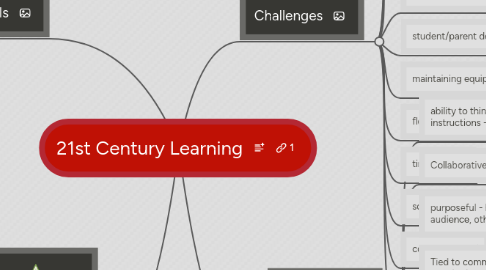
1. Tools
1.1. Computing Devices
1.1.1. Tablets
1.1.2. Desktops
1.1.3. Laptops
1.1.4. ereaders
1.1.5. mobile devices
1.2. Software
1.2.1. Digital Textbooks
1.2.2. Google Docs
1.2.3. Programming IDEs
1.2.3.1. Intro to programming
1.3. input devices
1.3.1. keyboard
1.3.2. voice recognition
1.3.3. touchscreen
1.4. current, fresh resources
1.5. personnel
1.5.1. community involvement
1.6. Lab Equipment
1.7. student response devices
1.8. ROBOTS!!
2. Outcomes
2.1. Measurables
2.2. Intrinsic motivation from enjoyment of learning
2.3. Student accountability
2.4. engaging
2.5. contributions to community
2.6. Student work for Authentic Audiences
2.7. Career readiness
2.7.1. real world readiness
2.8. conquer fear of technology (parents and teachers)
3. Challenges
3.1. Maintenance
3.2. user interface
3.3. access and equity
3.4. Staff comfort level with technology
3.4.1. Professional Development
3.4.1.1. eTraining (can watch videos from home
3.4.1.1.1. PD needs to be something that people are accountable for and able to do, which gets harder when you are doing it at home on your free time.
3.4.1.2. eTraining (can remote into a training from home)
3.4.1.3. team teaching/training during class
3.4.2. Level driven training
3.5. Adequate training
3.6. student/parent desire to use for purpose
3.6.1. Student/parent access
3.7. maintaining equipment
3.8. flexibility and freedom to experiment
3.9. timely repair
3.10. software updates
3.11. content control
3.11.1. monitoring use by students
3.12. lack of accessibility to some students outside of classroom
4. Principles
4.1. ability to think/create without instructions - create own work
4.2. Collaborative - students work as team
4.3. purposeful - has a genuine audience, other than the teacher
4.4. Tied to common core standards and strategic plan
4.5. skills not facts
4.6. Creators, not consumers
4.7. idea
4.8. view from a variety of perspectives
4.9. utilizes creativity and problem solving
4.10. academic focus/meaningful (not frivolous)
4.10.1. Technology as a tool, not just a "cool gadget"
